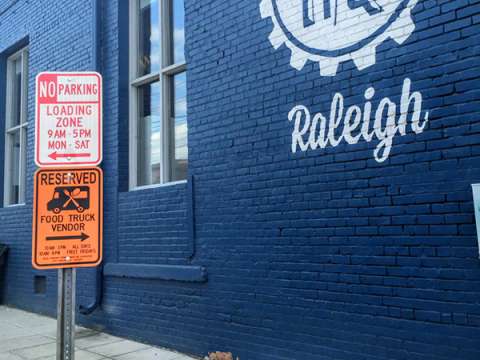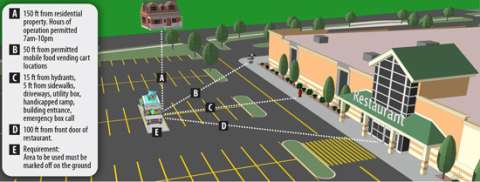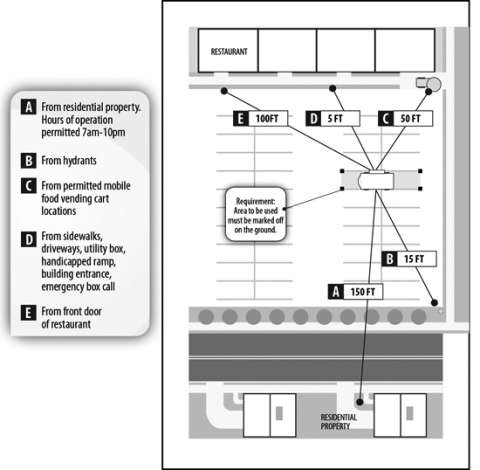Jump To:
Text Changes
On Dec. 4, 2012, the Raleigh City Council approved a text change for food truck regulations operating on private property.
The text change increases the number of trucks allowed on a lot. The change also allows food trucks within the entirety of the Downtown Overlay District. The changes were proposed after a six-month review of existing food truck regulations where no complaints or enforcement issues have been received. The slight increase in the number of trucks allowed on a lot is not expected to have any impact on existing restaurants or businesses.
Under the new regulations, a maximum of two food trucks are allowed on lots of one-half acre or less, three food trucks are allowed on lots between one-half acre and one acre, and a maximum of four food trucks are allowed on lots greater than one acre but less than two acres.
Exceptions to the process
- Food trucks may conduct sales while parked on a public street when the City Council has approved a temporary street closing for a City-sponsored or neighborhood event such as a street festival/fair
- Food trucks may operate on private property for a maximum of 20 days, three individual weekend events, or both each calendar year when utilizing a temporary event permit
Are there any prerequisites to the process?
Food truck vendors are required to obtain a Food Truck Permit for Vendors prior to operation on private property.
Any private property owner that wants to allow a food truck to operate on their property must obtain a Food Truck Permit for Property Owners.
How do I start the process?
1. Determine the Food Truck location on PRIVATE PROPERTY: Food trucks must be located at least 100 feet from the front door of any restaurant and outdoor dining area and at least 50 feet from any permitted mobile food vending cart location. Additionally, food trucks must be parked at least 15 feet from any fire hydrant, and 5 feet away from any driveway, sidewalk, utility box or vault, handicapped ramp, building entrance or exit, or emergency call box. These minimum distance requirements are all measured in a straight line from the closest point of the proposed food truck location to the closest point from the buffered object, or in the case of a restaurant, measured from the closest point of the restaurant's main entrance.
If a zoning permit is issued and a restaurant subsequently opens within 100 feet (measured from the restaurant's main entrance) of the approved food truck location, the food truck may continue to operate until the permit expires.
No food truck may utilize the right-of-way to serve customers without obtaining a separate zoning permit for food trucks within the right-of-way. This shall not apply to special events approved by the City.
2. Obtain the Required Permits: Two zoning permits are required to operate a food truck on private property - the Food Truck Permit for Vendors and the Food Truck Permit for Property Owners. An additional Streetside Vending zoning permit is required if a food truck serves customers from the right-of-way in any of the four permitted parking spaces identified by the City.
Vendor:
Food Truck Permit for Vendors - The food truck permit allows the operation of the food truck on private property in the City. The application must be completed and submitted along with copies of the following:
- N.C. Sales and Use Certificate
- Wake County Vending Permit
- N.C. Department of Agriculture Food Permit (if applicable)
- Copy of vehicle or trailer registration (required for new and renewal)
- Location of approved grease disposal facility (required for new and renewal)
- May require the approval of a Home Occupation Permit
- $150 fee
If the food truck is intended to operate in any of the four areas of the City for limited food truck services within the right-of-way, the following additional items are required:
- Certificate of Insurance through an insurance carrier authorized or eligible to do business in the state of North Carolina for any damage to the public right-of-way and for any damages which the City might incur liability because of property damage or personal injury arising from the use of the public right-of-way. The minimum liability limit of the policy shall be $1,000,000.00. The City of Raleigh shall be listed as an additional insured as its interests may appear on all Certificates of Insurance. The Certificate Holder must read as follows: City of Raleigh, PO Box 590, Raleigh, NC 27602.
- The vendor shall hold the City, its officers, councilors, and employees harmless and indemnify them for any loss, liability, damage, and costs/expenses associated with its operations by executing an Indemnity Agreement.
- The Indemnity Agreement can only be entered into by the named insured on the certificate of insurance and named applicant on the permit application.
- Be sure that all of the information is correct on the Indemnity Agreement, otherwise, the City Attorney will not accept it.
- Do not leave the first line blank - it must state what the encroachment is, such as food truck street vending, outdoor seating, etc.
- The "Undersigned" must only state the name of the business listed with N.C. Secretary of State. Do not abbreviate this - it must be listed EXACTLY as it is recorded.
- Be sure to list the type of business, such as Sole Proprietor, Corporation, LLC, etc.
- The printed name and title must be shown AND must be signed by the sole proprietor, a president or vice president of the corporation, the manager or managing member of the LLC, or the general partner of the partnership. Please verify the individual's name and title on N.C. Secretary of State's website first. - Be sure the document is signed and dated by a witness that knows their signature and authority to enter into the Agreement and provide the complete address including city, state, and zip code. - Provide an active Twitter account handle - this is added to the City's database and is required to access the scheduling application (necessary for scheduling your food truck at one of the four designated locations)
Property Owner:
Food Truck Permit for Property Owners - The zoning permit provides specific information regarding the location of the food truck.
The zoning permit for the property must be signed by the property owner and completed and submitted along with a site plan. If a property owner has a property large enough to accommodate more than one food truck, only one zoning permit is required to be submitted showing the location of all food trucks. The site plan must show the limits of the property, the location(s) of the proposed food truck(s), and label adjoining uses on neighboring properties. Food trucks must meet certain spacing requirements as listed below, so these adjacent land uses are a necessity.
Once these permits have been issued and the food truck is ready to operate, it is important to remember that a copy of the zoning permit for the food truck vendor, the zoning permit for the property owner, and site plan for all sites of which the food truck has received owner approval for vending must be kept on the food truck at all times. These permits must each be renewed annually on July 1st. If the operation of the food truck will be on the right-of-way, a separate food truck zoning permit is required. This permit will not renew on July 1st since the operation on the right-of-way is only in place for a six-month period.
3. Review the Food Truck Quick Reference Guide for helpful information relating to operation on private property.
What do I need to submit to the City?
| Type | Description |
|---|---|
| Required for Submittal (for operation on private property) |
Zoning Permit for Food Truck Vendors Home Occupation Permit (No outside employees allowed) Zoning Food Truck Permit for Property Owners Site Plan (not required for renewal, unless deviating from the original approval) |
Additional requirements for Food Truck Operators
1. Parking on Private Property: Food trucks may not occupy any required parking stall for the primary use while the primary use is open to the public. Food trucks and the primary use may share parking spaces when having separate hours of operation. Parking stalls that are overflow or extra according to the regulations in the Zoning Code may be used to park a food truck; however, parking stalls leased to another business or adjacent use may not be used unless the food truck is operating under separate hours of operation. Food trucks may not park in handicapped accessible parking spaces, nor can they park in access or drive aisles. The approved location for the parking trucks, as shown on the zoning permit, must be physically marked. The food truck parking space can be marked with paint, tape or any other easily identifiable material. Food trucks may not be parked in an approved location after hours of operation. (graphic of a parking stall with marked spots)
2. Parking on the Public Right-of-Way: The food truck may only be parked within the permitted parking space within the defined locations. All food trucks must be situated to allow at least five feet of unobstructed space for pedestrians on sidewalks, pedestrian paths, and other locations intended primarily for pedestrian travel. If any applicable law, including Americans with Disability Act (ADA) regulations, shall require a greater distance, the greater distance shall apply. The food truck shall not be located within 100 feet of the main entrance of any restaurant, any outdoor seating space, or any fixed-location or City-permitted pushcart business of a competing nature. If a restaurant subsequently locates within the minimum spacing requirement, the food truck may operate until the food truck permit expires. No food truck may be parked in a location that prohibits or restricts access to a private property. A minimum five foot spacing is required from any driveway, measured from the driveway apron. The food truck must be located at least five feet from any utility box, utility vault, handicapped ramp, or emergency call box. The food truck must be located at least fifteen feet from a fire hydrant. The food truck operator must dispose of all waste associated with the food truck operation. City receptacles may not be utilized for this purpose. No liquid waste or grease may be poured into any tree pit, storm drain, gutter pan, sidewalk, or any other public space. Grease cannot be released into the City's sanitary sewer system. The food truck operator shall make available hand sanitizer to its customers. Presently, booking is on a first-come-first-served basis through the Raleigh StreetFoodFinder app. A food truck vendor may only occupy one of the four spots, per day. A food truck vendor should not book a Saturday and a Sunday consecutively in order to provide customers with a variety of cuisine. As a courtesy to their customers, if a food truck vendor has to cancel, they must find a permitted food truck vendor replacement prior to cancelling.
3. Hours of Operation on Private Property: Food trucks may operate between the hours of 6 a.m. and 3 a.m., unless the food truck is located within 150 feet of a property with a single or two-family residential dwelling. When located within 150 feet of this residential dwelling, the hours of operation shall be between 7 a.m. and 10 p.m. This measurement is taken from the property line of the residential dwelling in a straight line to the closest point of the approved food truck location.
4. Hours of Operation on Public Right-of-Way: A food truck may operate within the permitted parking space on every day of the week from 10 a.m. to 3 p.m. During the First Friday Festival each month, a food truck may operate from 4 p.m. until 8 p.m. The food truck may not operate or park within the permitted parking space before 10 a.m. and must cease operation and leave the permitted parking space by 3 p.m., except during the First Friday Festival. As a courtesy to customers, please plan to serve food from 11 a.m. to 2 p.m.
What is prohibited and may result in a violation?
Prohibitions on Private Property: Food trucks may not use audio amplification or freestanding signage. All equipment associated with the food truck must be located within 3 feet of the food truck. The food truck operator is responsible for disposing of all trash associated with the operation of the food truck. City trash receptacles may not be used to dispose of trash or waste. All areas within 5 feet of the food truck must be kept clean. Grease and liquid waste may not be disposed of in tree pits, storm drains, the sanitary sewer system or public streets. Food trucks are all subject to the citywide noise ordinance (Sec. 12-5007(c).Sec 12-5008). Sound absorbing devices may be used to contain or deflect the noise from external generators.
Violation of Ordinance: If the food truck operator or property owner is found to be in violation of the Zoning Ordinance, a fine will be issued. For the first offense, a $100 fine and $100 administrative fee will be issued. Any additional violations will result in $500 per day fines.
Prohibitions on the Public Right-of-Way: The food truck operator shall not utilize tables, chairs, free-standing signage, or audio amplification in conjunction with the food truck. All equipment shall be contained within or on the food truck.
Violation of the Streetside Vending Ordinance on the Public Right-of-Way: If the food truck operator is found to be in violation of the Streetside Vending by Food Trucks regulations, a fine will be issued. For the first offense, a $100 fine and $100 administrative fee will be issued. A second offense in any twelve-month period will result in a $500 fine. A third in any twelve-month period will result in revocation of the permit.
Where do I submit my application?
City of Raleigh
Department: Planning and Development
Division: Zoning Enforcement
Address: One Exchange Plaza, Suite 300, Raleigh, NC 27601
Phone: 919-278-6209
Hours: Monday through Friday, 8:30 a.m. - 4:30 p.m.
What are the keys to success?
- Complete submittal package to include required documentation
- Provide copies of required documentation (copy service is not available)
What fees are involved and when do I pay them?
- Food Truck Permit for Vendors operating on private property. See the Development Fee Guide for current fees.
- Food Truck Permit for Property Owner. See the Development Fee Guide for current fees.
- Streetside Vending - Food Truck Permit for Vendors. See the Development Fee Guide for current fees.
- Permit fees are paid after permit approval, during issuance.
How long will the process take?
- Food Truck Permit for Vendors takes approximately two (2) business days
- Food Truck Permit for Property Owners takes approximately three (3) business days
- Streetside Vending - Food Truck Permit for Vendors takes approximately two (2) business days


